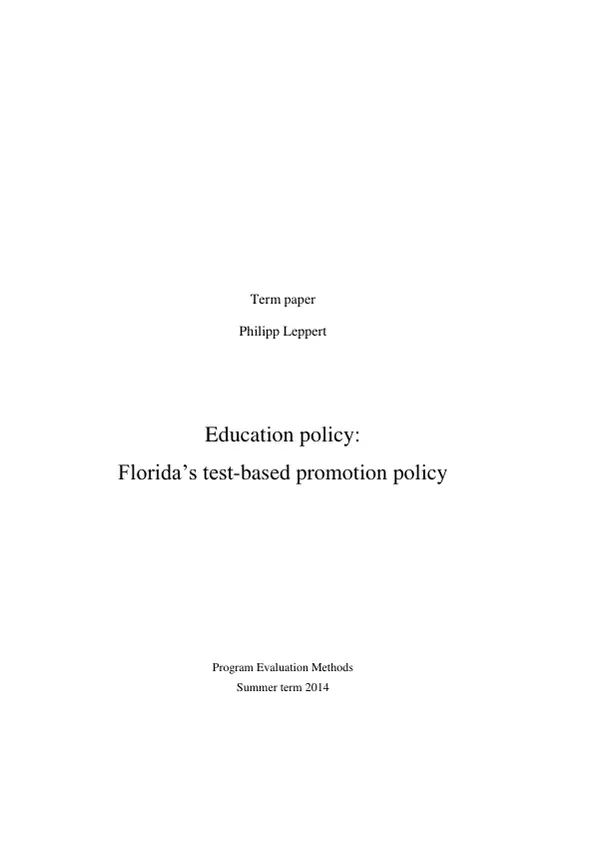This paper aims to provide an overview of the outcomes of the test-based promotion policy for the federal state Florida, introduced in 2002. The first chapter will deal with specific features of Florida’s test-based promotion policy, followed by the research design that was used by Schwerdt and West (2013) to evaluate the program. Afterwards, estimation results and the treatment effect are discussed, including results of Chicago’s test-based promotion policy to compare the findings of different studies.
Inhaltsverzeichnis (Table of Contents)
- 1. Introduction
- 2. Specification of Florida's Retention Policy
- 2.1 Provision of Remedial Services
- 2.2 Promotion through Exemptions
- 2.3 Developmental Scale Scores
- 3. Evaluation Method: Fuzzy Regression Discontinuity Design
- 3.1 Application of the Fuzzy RDD in Florida
- 3.2 Graphical Illustration
- 3.3 Bandwidth Choice
- 3.4 Exclusion of the Manipulation of Test Scores
- 4. Estimation Setup and Treatment Effect
- 4.1 Linear Probability Model and Two Stage Least Squares
- 4.2 Composition of the Treatment Effect
- 4.2.1 Summer School Attendance
- 4.2.2 Assignment to a High-Quality Teacher
- 4.2.3 Incentive Effects
- 4.3 Comparison: Chicago's Accountability Policy
- 5. Conclusion
Zielsetzung und Themenschwerpunkte (Objectives and Key Themes)
This paper aims to evaluate the effectiveness of Florida's test-based promotion policy, implemented in 2002, by analyzing its impact on student academic performance. The study focuses on the period from 2002 to 2008, observing students in grades 3 to 9.
- The effectiveness of test-based promotion policies in improving student outcomes.
- The role of standardized testing in assessing student performance.
- The impact of retention on student achievement.
- The comparison of different accountability policies, specifically those in Florida and Chicago.
- The application of appropriate program evaluation methods, particularly the Fuzzy Regression Discontinuity Design (RDD).
Zusammenfassung der Kapitel (Chapter Summaries)
- Chapter 1: Introduction: Introduces the topic of Florida's test-based promotion policy and its aim to end social promotion. Discusses the historical context of retention policies and the debate surrounding their effectiveness.
- Chapter 2: Specification of Florida's Retention Policy: Provides a detailed overview of the policy's provisions, including the provision of remedial services, promotion through exemptions, and the use of Developmental Scale Scores (DSS).
- Chapter 3: Evaluation Method: Fuzzy Regression Discontinuity Design: Explains the methodology used to evaluate the policy, specifically the Fuzzy RDD design, and how it is applied in the Florida context. Discusses graphical illustration, bandwidth choice, and the exclusion of test score manipulation.
- Chapter 4: Estimation Setup and Treatment Effect: Presents the results of the analysis, including the treatment effect, and examines the composition of this effect by exploring the roles of summer school attendance, assignment to high-quality teachers, and incentive effects. Compares the findings to those of a similar study in Chicago.
Schlüsselwörter (Keywords)
This paper focuses on key concepts such as test-based promotion policies, social promotion, standardized testing, student performance, grade retention, program evaluation methods, Fuzzy Regression Discontinuity Design (RDD), Florida Comprehensive Assessment Test (FCAT), Developmental Scale Scores (DSS), and the comparison of different accountability policies, particularly those in Florida and Chicago.
Frequently Asked Questions
What is Florida's test-based promotion policy introduced in 2002?
It is a policy that requires students to achieve a certain score on standardized tests (like the FCAT) to be promoted to the next grade, aiming to end "social promotion."
How does grade retention affect student academic performance in Florida?
The paper analyzes estimation results and treatment effects to determine if repeating a grade helps or hinders long-term academic achievement.
What is the "Fuzzy Regression Discontinuity Design" mentioned in the study?
It is the statistical evaluation method used to analyze the impact of the policy by comparing students just above and just below the test score cutoff.
Are there exemptions to the retention policy?
Yes, the policy includes provisions for promotion through specific exemptions and the provision of remedial services like summer school.
How does Florida's policy compare to Chicago's accountability policy?
The paper includes results from Chicago's test-based promotion policy to provide a comparative analysis of different state-level education strategies.
What factors contribute to the "treatment effect" of being retained?
The effect is composed of various factors, including summer school attendance, assignment to high-quality teachers, and specific incentive effects for students.
- Quote paper
- Philipp Leppert (Author), 2014, Florida's Test-Based Promotion Policy. How Does Retention Affect Students' Academic Performance?, Munich, GRIN Verlag, https://www.grin.com/document/309837



